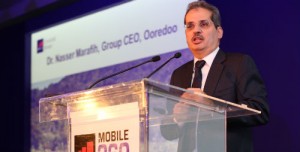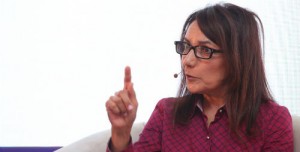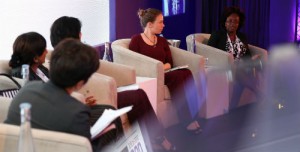Power of Women: Transforming Businesses and Lives
In early October, for the second year running GSMA Connected Women hosted a summit at the GSMA Mobile-360 Africa conference in Cape Town, exploring how the mobile industry can realise the various socio-economic benefits of including women in their mobile outreach. Hot topics included: how to increase women’s access to mobile phones, enabling women’s financial inclusion, enhancing digital literacy for women and attracting more girls to the technology industry. If you couldn’t make it to the GSMA’s Mobile 360-Africa this year, here are the top 3 things you need to know about the event.
1. The Mobile Industry is poised to reach more female customers
The GSMA Chief Strategy Officer, Hyunmi Yang, opened the event, sharing her experience and vision as a woman in a senior leadership position for the biggest mobile network association in the world. The keynote was delivered by Dr. Nasser Marafih, who focused on how the mobile industry should be supporting Sustainable Development Goal no. 6 (to achieve gender equality for all women and girls) commenting during his speech that it is ‘the most important of all the SDG goals’. Dr. Nasser also touched on the positive work of Ooredoo in Myanmar, where the operator has achieved significant successes (increased female uptake from 15% to 70%) following Ooredoo’s first app launch. According to The Economist, Ooredoo is on target to be one of the four Myanmar operators projected to r each 90% of the population in the next five years .
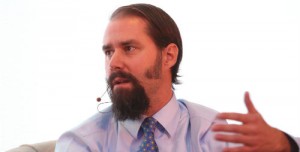
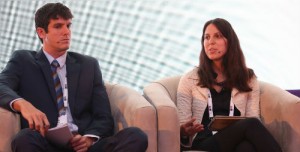
The Summit was divided into four sessions with panel discussions with intriguing guests from the operator space, development sector as well as speakers from the wider mobile ecosystem.
The first panel focused on addressing barriers to reach the estimated 1.7 billion females in low-and middle-income countries who do not own a mobile phone. Panellists included Kellen Eilerts (HNI), Ingrid Brudvig (World Wide Web Foundation) and Christopher Burns (USAID Global Development Lab) and was moderated by Claire Sibthorpe (GSMA Connected Women).
The second session focused on mobile money, women’s financial inclusion and how to unlock this opportunity in emerging markets. Georgia Barrie (GSMA Connected Women) gave an animated account of Connected Women’s research on the topic in Kenya, the birthplace of mobile money. One memorable finding presented was that Kenyan women tend to be more meticulous in the way they manage money and, contrary to common perception, men are typically less price sensitive to mobile money products and services. Speakers joined from many established organisations for the panel discussion that followed, including: Elizabeth Kellison, (Bill and Melinda Gates Foundation), Cindy-Anne Lewis, (Ericsson), Kristen Waeber, (Zoona), and Faith Chisulo (Tigo Rwanda), and moderator for the discussion was Gerry Wasugu (GSMA Mobile Money).
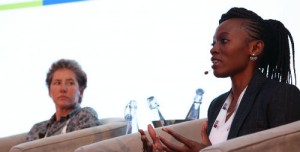
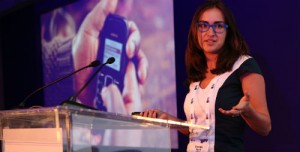
Shireen Santosham (GSMA Connected Society), opened the third session by presenting findings from the joint research project by GSMA Connected Women and Digital Inclusion, on women’s mobile literacy and the challenges women face when accessing mobile internet in Kenya, India and Indonesia.
The panel discussion that ensued dwelled deeper into how we can accelerate digital literacy for women, and embarked on recommendations for practical approaches to address these challenges. Julia Burchell (moderator) of the GSMA was joined by Suraj Shah (Intel Corporation), Tina James, (Femtech) and Anar Simpson (Mozilla).
The final panel discussed how to address the digital skills gap and attract more girls to our industry, and was moderated by Claire Sibthorpe, who was joined by a strong all-female panellist line-up with Cathy Smith (Cisco South Africa), Josephine Ndambuki (Safaricom), Sharoda Rapeti, (Deloitte Africa), and Emma Dicks (Code for C ape Town).
2. “We can’t do it without the Operator”
GSMA is an operator driven trade association, we know that we can’t achieve social change without Operators. However, it is not just GSMA saying it. Panellists across the spectrum agreed; operator engagement is vital to break gender barriers for women’s engagement in the mobile economy. There are clear commercial benefits as well as broader positive socio-economic gains to be realised where effective partnerships with ‘on the ground’ organisations (e.g. NGOs) are realised.
Despite big pushes from Operators to include women in their products and services in recent years, major obstacles to greater engagement remain. As highlighted by USAID’s Chris Burns, issues of affordability, education and local content seem to be most pressing, although cultural barriers continue to prevent women’s access to mobile in developing countries.
Shireen Santosham (GSMA Connected Society) shared findings that highlight how women in Indonesia wanted to ‘learn mobile’ on their own, but friends and family would sometimes tell them it was ‘not appropriate for them to be online’. According to Georgia Barrie (GSMA Connected Women) similar cultural barriers are one reason that women are up to 30 – 40% less likely to have a mobile money account in certain African markets.
Digital literacy, education and cultural inhibitors seemed to be a consistent complaint across the Summit’s panellists. Suraj (Intel Corporation) commented that of 250 women interviewed in Africa, 98% owned a mobile, of which 90% had twitter or Facebook but almost none of them could surf or safely find information online (see GSMA Connected Women’s Gender Gap study for more information barriers to women’s use of mobile) .
Panellists also discussed how to improve mobile service adoption by focusing on women’s needs and wants, for example, by targeting services around household tasks. Several speakers suggested that an ‘informed’ approach was key to greater digital inclusion, sustainable and scalable services.
In order to understand the customer (female) journey, it is important for operators to make better use of gender disaggregated data, an area where many operators traditionally face challenges in collating . Ingrid (World Wide Web Foundation) highlighted the importance of overcoming internal barriers to gender disaggregated data stating that; to appreciate why women ‘fall-off’ the user journey, it is important to analyse different demographics beyond “women” as a homogeneous group with the same wants and desires. For instance, Faith Chisulo (Tigo Rwanda) recalled from her experiences within an operator in Rwanda that, when they made better use of their mobile money data, it revealed useful insights on how women had different sending/receiving patterns to men and did not always manage the household finances.
The value of operator’s gender disaggregated data was a hot topic, where panellists reported that a lack of consumer insights is one of the biggest barriers to including women in mobile service design. In considering that only 23% of operators are using gender disaggregated data, there is still significant benefits to be gained in this space, of which operators hold the key. To quote Liz Kellison of the Bill and Melinda Gates Foundation: ‘mobile operators are going to solve this one.’
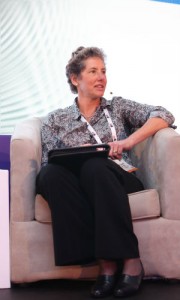
3. Long term partnerships are key for action
Finally, discussions at the Summit centred on the issue of building lasting relationships between major industry players (such as the operator community) and the wider ecosystem (e.g. NGOs) particularly where effective governments are lacking (such as in many Late Developed Countries). For instance, Ingrid Brudvig (World Wide Web Foundation) referenced the work of the Alliance for Affordable Internet as an example of how collaboration can make connectivity more affordable for those living in low- and middle-income countries .
In the final session of the Summit, panellists commented that female participation in the top echelons of operator organisations is a common denominator for increasing gender equality in the mobile economy. Indeed, it should ‘be a business imperative to focus efforts on getting more women in the door’ [of Operators] commented Cathy Smith (Cisco). Emma Dicks (Code for Cape Town) added that in order to achieve more women at the top we need to ‘…educate women from a young age to become involved’ and also give women ‘…an understanding of technology so that they can contribute meaningfully’ particularly in strategic planning for big technology companies. If we are going to get more products and services in emerging markets, which engage women at all levels, it is vital that women also have a powerful role within mobile network operators themselves.
In summary, as many panellists agreed, the role of initiatives like the GSMA’s Connected Women are critical to support and build robust partnerships between operators and the wider ecosystem to drive change at all levels. Connected Women aims to put operators at the heart of mobile for development innovations that will improve the lives of women across the developing world, and I personally look forward to seeing some positive collaborations between Operators and the development community following the Summit in Cape Town this year.


